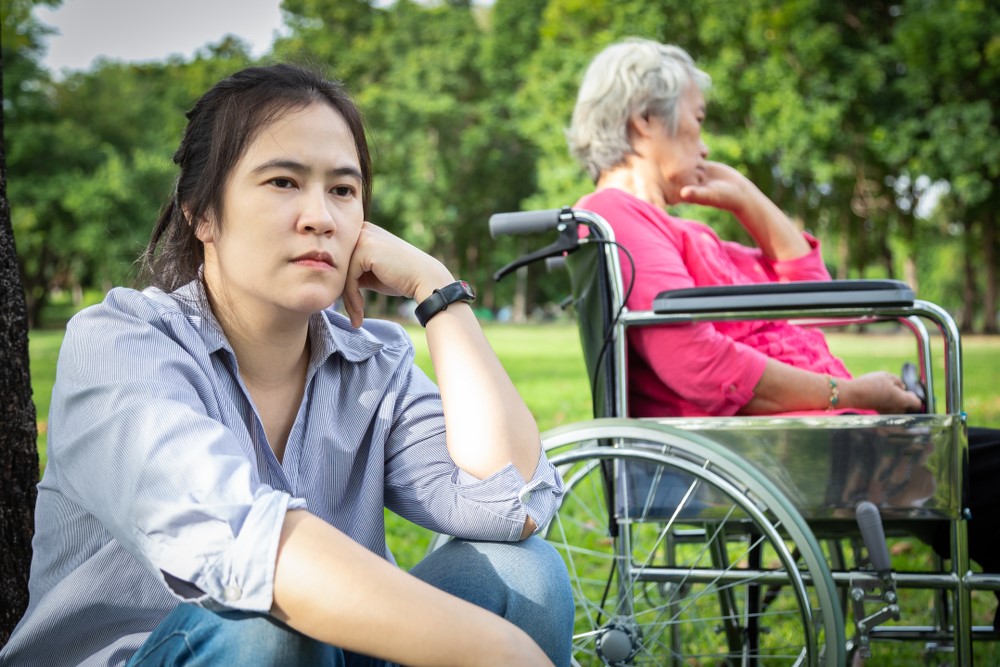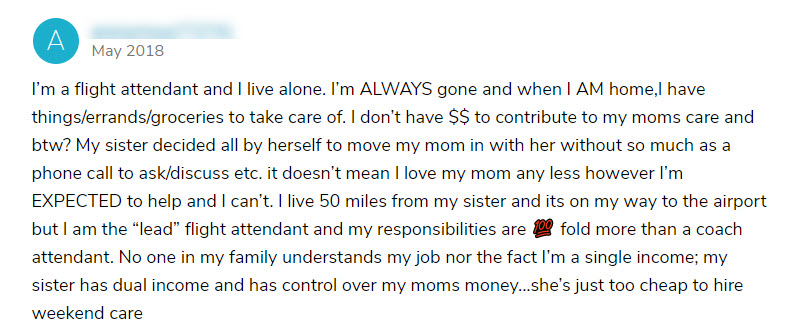
Our parents brought us into the world. They often provided love, care, and support, while also giving us the knowledge and tools to thrive. Caring for our parents as they age seems like the obvious way to repay them. Yet, some people ask: Can I refuse to care for an elderly parent?
The question isn’t as surprising as it might seem.
After all, providing care is no small task. It can be draining both emotionally and physically. Some adult children find that they put their lives on hold, compromising their own relationships, retirement savings, careers, and much more.
There are two important questions to think about. The first is whether you can refuse to provide care, while the second is, if you can, should you?
The answers to both questions might seem obvious at first glance. Yes, you can refuse and no, you shouldn’t. But, both questions are more nuanced than they first appear.
So, let’s take a look.
While this post contains up-to-date and well-researched information, you should always seek legal advice before deciding on how to approach elder care (there are some affordable legal aid options that can help if finances are tight). An expert will be able to provide advice that’s specific to your situation. This is crucial, as laws vary depending on where you live and there are often complicating factors.
Listen To This Post Here:
Why You Might Refuse to Provide Care
There are plenty of viable reasons for choosing not to provide care for your family member, including the following.
- Lack of time. Caregiving takes time and energy, which you simply may not have. Time is even more significant for people who are working and raising children at the same time. There’s only a limited number of hours each day and not enough time for everything.
- Financial strain. Providing care often comes at a financial cost. Plus, being a caregiver might decrease your income as well, which just adds to the financial strain.
- The emotional burden. Providing care is emotionally draining. This is an even bigger problem if you don’t have a good relationship with your parents. The emotional side of caregiving shouldn’t be overlooked, as it can be overwhelming and not everyone can cope with it.
- The physical impact. Many people find that their physical health takes a toll when caregiving. This might be because of the physical tasks involved or because of stress.
- Your health. Any problems with your physical or mental health are additional reasons to be wary of providing care. Supporting your parent could easily make these things much worse.
- There are other family members. Even if you’re the first logical choice as a caregiver, there are often other people who can provide care.
- They were (are) abusive. While many children grew up with kind and loving parents who tried their best, this wasn’t always the case. Some had difficult, toxic, or abusive parents.
- Your family responsibilities. Many adult children have their own families to support too, including spouses and young children. There often isn’t enough time, energy, or resources to support them well at the same time as providing care for aging parents.
These reasons aren’t mutually exclusive. Instead, you may experience many of them to some degree.
These patterns are incredibly important, as they mean that providing care may end up causing you considerable harm. There are even many cases where the cost of caregiving is so high that the adult child dies before their parent.
Can You Refuse to Care For Your Parents?
Many countries don’t just have a social expectation that adult children care for their parents. There’s sometimes a legal obligation too.
Interestingly, some laws in the United States make you responsible for your parents too, although only in some situations.
Currently, 27 states and Puerto Rico have at least one law that makes people responsible for their family members. These laws mostly apply to adult children with elderly parents – specifically to cases where the parent is not able to financially pay for their own care.
Click here to see the full list of states with filial responsibility laws
- Alaska
- Arkansas (only for mental health care)
- California
- Connecticut (only if there is a written agreement)
- Delaware
- Georgia
- Indiana
- Kentucky
- Louisiana
- Massachusetts
- Mississippi
- Nevada (only if there is a written agreement)
- New Jersey
- North Carolina
- North Dakota
- Ohio
- Oregon
- Pennsylvania
- Puerto Rico
- Rhode Island
- South Dakota
- Tennessee
- Utah
- Vermont
- Virginia
- West Virginia
Most of the time, the income level of both the parent and child is considered. This means that if your income is low, you shouldn’t be obliged to pay for your parent’s bills. The presence of other siblings will probably be considered to.
The laws also vary in their exact criteria and how they are enforced. This means that even if you’re in a state with parental support laws and you have a decent income, there’s no guarantee that you’ll be required to support your parents.
In fact, relatively few adult children ever end up being forced to support their parents.
Even so, you should always talk to a lawyer about your specific situation before making any decision. Doing so helps you to be aware of potential issues right from the beginning.
Should You Care For Them?

The question of whether you can refuse to care for parents often isn’t the one that keeps people up at night. The more challenging one is whether you should care for them. Or, more relevantly, whether you’re still a good person if you don’t provide care.
First of all, should is a surprisingly tricky concept.
It implies that there is a right and a wrong way to approach a given situation. But, most of the time, that isn’t true at all.
As we highlighted earlier, there are plenty of good reasons that adult children mightn’t be able to support their parents well. The writer below, for example, is one of many adult children that don’t provide much care or support for their aging parent.

Plus, if providing support comes at a considerable physical, mental, financial, or emotional cost for you – you’re not likely to be able to do it well. Indeed, caregivers often burn out when the demands on them are too much and burnout decreases the quality of care provided.
And, in most situations, caring for your parent is a choice.
You can decide to provide care – or to not to.
Choosing not to provide care doesn’t make you a bad person. Indeed, one forum participant made an important point in the debate:

As they mention, sometimes the reason that parents require so much care is because they didn’t plan for the future. Some even intended to rely on their adult children, regardless of the cost to the child.
Yet, somehow, the social expectation is that caring for your parent is right and not doing so is wrong.
You’re not alone if you’re debating about providing care. Plenty of adult children struggle with the same dilemma. Indeed, in many families, only one sibling provides care for their aging parents, even if the family was large.
The truth is that life is complicated. So are people and families.
Sometimes being actively involved in care just isn’t feasible or would be a bad idea.
What’s Best?
There’s one more important point here – sometimes supporting your elderly parent isn’t best for them either.
Let me give you two examples.
The first is a mother who is getting on in her years but still can do most things independently. Despite this, she is very demanding and wants to move in with her daughter, so that she can be better supported.
Moving the elderly mother in would almost certainly be a bad idea. There would probably be many conflicts around the home and could easily lead to resentment and even anger. Plus, being very supportive to a demanding parent is similar to indulging a spoiled child (i.e. not healthy for them or for you).
The second is trying to care for your father at home, even has it becomes more difficult due to dementia. Perhaps you made a promise that you’d never send him to a facility.
But, dementia care is incredibly overwhelming. It’s also emotionally devastating for children to watch their parents change as the disease progresses. These aspects alone can make caring for the elderly person difficult.
Plus, adult children don’t have the experience or training needed to support the senior well. Many day-to-day parts of your life end up being incredibly confusing to the senior, making life more difficult for everyone. Choosing to put them in a facility often ends up being kinder for everyone.
Alternative Approaches to Consider
The question ‘can I refuse to care for my elderly parent?’ implies that either you provide in-person support and care, or you leave them alone to suffer.
However, those aren’t your only options.
A common alternative is to provide support from a distance. What this looks like will depend on your situation, but some examples include:
- Providing a regular financial stipend to help cover the gap between their income and their expenses.
- Paying for an in-home caregiver to visit when required.
- Offering to cover some, or all, of their costs in an assisted living facility.
- Working with other family members to make sure that someone else provides practical support, while you help in less direct ways.
- Leave it to other family members to provide support. It can be surprising to see who steps in to fill the gap when you don’t. Some people find that the rest of the family pulls together in unexpected ways, leaving the senior well-cared for.
You’ll probably notice one pattern here – the approaches all require money or some other source of assistance.
What do you do if neither is an option?
One approach is to set clear boundaries. When doing so, take a close look at what the senior actually needs (rather than what they want), along with your own needs.
You could also ask local senior care centers, area agencies on aging, and even local healthcare agencies. They may know of additional options for making sure your parent is supported.
Final Thoughts
Take your time.
Seriously.
This is one of the most important things you can do when thinking about whether to care for your elderly parent. Take the time to weigh up your options carefully, as many care-related decisions cannot be easily reversed.
Indeed, many adult children find that moving their parents in with them simply doesn’t work out.
Whatever decision you make, be it to provide care or not, you’re likely to be judged. Don’t let that determine what you’re going to do – because there will always be people who judge. Honestly, it doesn’t matter what you do, some people always think that you should take a different approach.
This pattern is particularly true for caregiving. Countless adult children find themselves at their wits end, as nothing they do seems to be right.
At the end of the day, it’s your perspective that matters. While you might turn to other people for advice, rely on your own experiences too. You’re the only one who knows the ins and outs of the situation – and no one else knows what caregiving would cost you.
Feeling Overwhelmed?
Check out our Caregiving Consulting service for personalized support and guidance.


Leave a Reply